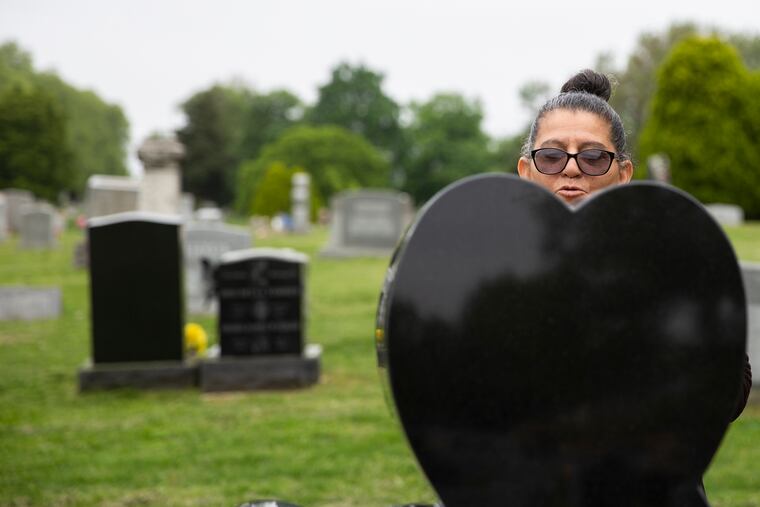This Philly mother made a promise to her dead son. Can she keep it? | Helen Ubiñas
The pleas are constant, families desperate not to be left in the dark about their loved ones' murders.

The mother called from the cemetery, because where else would she be if not where she’s been nearly every morning since her youngest son was shot and killed four years ago?
Every day, the same enduring ritual.
Elsa Alicea, 61, wakes early and makes the coffee the way her Puerto Rican mother had taught her and her mother’s mother had before that: with a few scoops of ground Café Bustelo brought to a boil in a well-worn aluminum pot and drained through a cloth strainer.
She fills a small silver thermos with the strong brew, drives to Greenmount Cemetery, and then climbs a small hill to her son’s grave so they can share a cup the way they used to every morning.
She makes sure to tidy up around his tombstone, the one with the double hearts, as she greets him. She tells him she loves him and, always, she promises she won’t give up until whoever is responsible answers for his death.
Luis Martin Alicea, 29, was shot outside of a barbershop on Nov. 18, 2016.
“Don’t worry, papi,” she tells him. “I won’t give up.”
Except as the years have passed, she worries it’s a promise she won’t be able to keep.
The first year or so after her son’s death, she said, police were good about returning her calls, about making her and her family feel that they were working hard to solve his murder. When her other children worried no one had been arrested, she told them to have faith. She focused on caring for her family, including a grandchild with Down syndrome.
But each year brought fewer returned calls, fewer assurances that her son’s death hadn’t fallen through the cracks. The stress has affected her and her 63-year-old husband’s health.
During one of the last conversations she had with a detective, she thinks more than a year ago, she caught the catch of impatience in his voice.
And yes, she conceded, maybe she annoyed police by calling almost every week in the beginning. But she doesn’t call as much anymore; she watches the news, she knows that every day there are more and more murders, more and more families desperate for the same answers.
Even as Alicea and I talked, I got an email from a woman asking if I could write about another unsolved murder, this one of a 14-year-old girl killed in 2003 alongside her mother and her mother’s boyfriend.
“Her blood cries for justice,” the woman wrote. “Please consider telling her story.”
These are constant pleas to call attention to loved ones’ lives, and deaths, to get any answers from a police department where for the last several years only about half (sometimes less) of homicides are solved.
I’ve written about a lot of them. I could write one a day for years and still not get to everyone.
I’ve also written about the ongoing lack of communication between homicide detectives and families.
There are reasons, police say. Too many cases, not enough detectives or hours in a day. Antiquated, if nonexistent, technology. Last I checked, messages are still collected in an old wooden box, full of pink “While You Were Out” notes.
There have been efforts to improve communication, families coordinating meet-and-greets with detectives, holding a three-day protest to call attention to unsolved murders outside Police Headquarters that briefly, anyway, suggested a new day.
Calls and emails from families prove otherwise.
Sometimes, even if I don’t write about the case, I call the Police Department on a family’s behalf. I nudge the detectives I might know.
This time, I asked the department’s office of public affairs if I could talk to the detective and the head of homicide Capt. Jason Smith. My request was denied.
“They are unavailable at this time for an interview,” a spokesperson emailed. “There are no new updates for this incident. The investigation is still active and ongoing with Homicide Detectives Division. If anyone has information in reference to this homicide, they can call 911 or submit a tip to 215-686-TIPS (8477).”
I considered reminding him that I’m not reaching out on behalf of a tipster, but a mother desperate for answers. And even if there aren’t any, for reassurance that her son’s murder has not been forgotten.
Instead I ask if someone can maybe call the mother because she hasn’t heard from anyone since last year.
I wait a few days and call Alicea back to see if she’d gotten any answers. She hadn’t.
She’d just left the cemetery, where she once again made promises to her son.